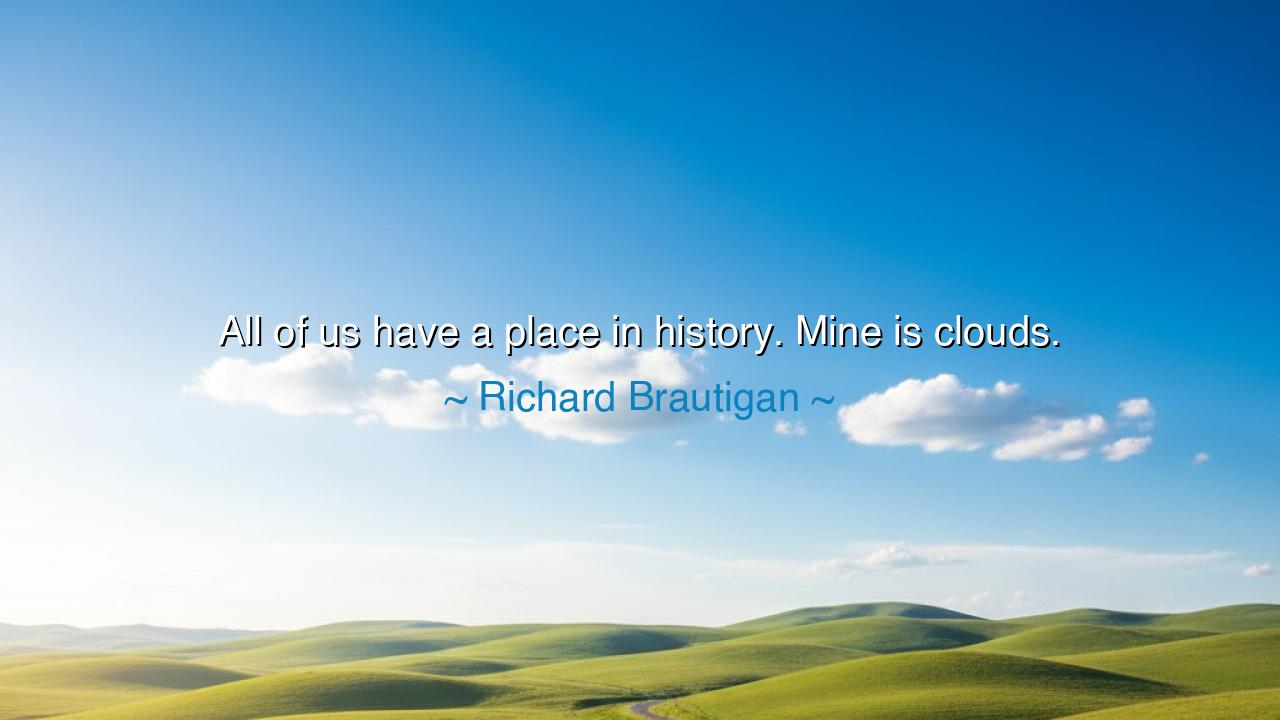
All of us have a place in history. Mine is clouds.






“All of us have a place in history. Mine is clouds.” — Thus spoke Richard Brautigan, the poet of gentle absurdities, the dreamer who walked between laughter and loneliness. His words shimmer like light on water — simple, yet profound, soft, yet filled with meaning. In this short confession, Brautigan gives voice to a truth that has comforted the wise and haunted the weary since time began: that every soul, no matter how small or strange, belongs somewhere in the story of existence. Yet some are not meant to build empires or command armies; some are meant to drift, to dream, to remind the world of beauty and impermanence.
To say “All of us have a place in history” is to acknowledge that every life, whether humble or grand, contributes to the vast symphony of time. History is not merely the record of kings, conquests, and revolutions — it is also the quiet hum of everyday hearts, the songs of those who look at the sky and imagine. Each person adds a thread to the great tapestry of humanity, and even the faintest colors give depth to the whole. The builder leaves his monuments in stone; the poet leaves his traces in the air. Both are necessary, for without the dreamer, the monument would have no soul.
And when Brautigan says, “Mine is clouds,” he declares with humility and wonder that his place lies not among the solid or the lasting, but among the fleeting and the free. The clouds are symbols of imagination, of change, of beauty that cannot be grasped. They drift without destination, yet they adorn the heavens. So it is with the artist, the philosopher, the wanderer — those who do not conquer or construct, but contemplate. Brautigan’s clouds are the realm of the dreamer, the poet’s refuge, the realm of all who live by thought and vision rather than by law and power.
Throughout history, there have been many whose place was among the clouds — Vincent van Gogh, for instance, whose art was misunderstood in life but became immortal in death. He built nothing of stone, ruled over no one, yet his colors transformed the sky forever. He lived in the fragile realm of emotion and imagination — and though the world did not understand him, his legacy lives in the hearts of those who feel deeply. His story teaches us that not all greatness is tangible; some greatness exists in the unseen, in the way one’s vision stirs the soul of others, long after the painter himself has faded.
The ancients understood this too. In Greece, they spoke of the philosopher as one who lived “under the heavens,” seeking the eternal patterns of truth. While warriors and politicians shaped the visible world, the thinkers shaped the invisible. Socrates, walking barefoot through Athens, taught not by sword or decree, but by question and reflection. His place in history, too, was among the clouds — unseen, ethereal, yet enduring. He left no fortress, yet his thought became the foundation of civilizations.
Brautigan’s words carry another truth as well — that there is peace in knowing one’s place. Not all must strive to be remembered in marble. Some souls, by nature, belong to the wind and the sky. They teach us that to drift with purpose is not weakness, but wisdom. The clouds do not envy the mountains; they move, they change, they give rain and shade, and in their impermanence, they are eternal. To know this is to live without the burden of comparison, to find contentment in one’s own form of contribution.
Let this be your lesson: your place in history need not mirror that of others. You may build bridges, or you may inspire dreams; you may lead armies, or you may write poems to the sky. Whatever your calling, embrace it fully. Do not measure your worth by permanence — even the clouds, though ever-changing, shape the light of the world. What matters is not how long your mark endures, but how truthfully it reflects your soul.
And so, remember the wisdom of Richard Brautigan: that history belongs not only to the conquerors, but also to the dreamers. That even those who dwell in clouds give meaning to the earth below. Live, then, not in pursuit of immortality, but in harmony with your nature. For when the story of time unfolds, every heart will find its place — and yours, whether in the soil or the sky, will shine in its own eternal way.






AAdministratorAdministrator
Welcome, honored guests. Please leave a comment, we will respond soon